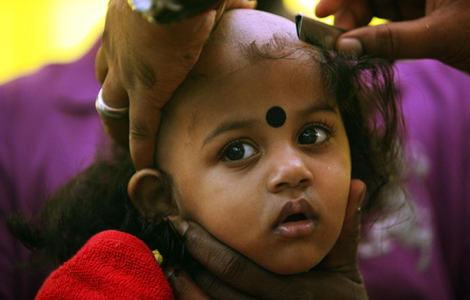New rule on HIV disclosure sparks debate
Updated: 2012-02-07 07:59
By Shan Juan (China Daily)
|
|||||||||||
BEIJING - HIV-positive men and women in the Guangxi Zhuang autonomous region may soon be required by law to tell partners their status the moment their test results are known.
The regulation, still in draft form, is expected to take effect in six months, said Ge Xianmin, director of HIV/AIDS prevention and control at the local health department.
It stipulates that the sufferer has to tell his or her partners within three days of being confirmed as HIV positive. If not, this would be done by health workers.
"Given that Guangxi has been hit relatively hard by HIV/AIDS and that sex has become a major transmission route, such rules would help protect sufferers' partners and avert secondary transmissions," he said.
It also helps partners to supervise sufferers' treatments, he added.
Of the total of HIV cases detected last year in Guangxi, about 87 percent were infected through unsafe sex, both homosexual and heterosexual.
Only the northwestern province of Gansu has a similar rule, which was introduced in 2009.
Xiao Dong, leader of a civil organization committed to HIV/AIDS control in Beijing, backed the regulation.
"The sufferer should inform their partners because one's life is more important than personal freedom. We mustn't satisfy our selfishness by harming other's lives," he said.
But Meng Lin, an AIDS patient in Beijing, believes regulation is an intrusion of privacy.
"I don't think the Guangxi regulation should make health institutions inform sexual partners of someone's HIV-positive status if that person refuses to do so," he said.
Meanwhile, to keep better track of HIV carriers for the provision of support and medication, the new regulation will require people to show identification before undergoing HIV screening, which gives preliminary results in 15 minutes subject to laboratory confirmation.
Ge said many people simply disappeared after screenings showed positive results, which made follow-up counseling and treatment very difficult.
Xiao Dong said: "We should respect people's choice of whether to give personal information or not. Not everybody going for a HIV screening is prepared to face up to the impact on their lives if it proves positive and they will be less stressed going anonymously."
Meng Lin warned: "Given HIV/AIDS discrimination and stigma are still rife here, it will drive more potential sufferers away and lead to more inaccurate statistics about the epidemic."
In most parts of China, only confirmatory tests require ID registrations, said Wu Zunyou, director of the National Center for AIDS and Sexually Transmitted Diseases Control and Prevention.
In Yunnan province and Beijing, people have to present ID for screenings.
However, in Beijing, which issued the rule last year, this has led to a big drop in the number going for HIV screenings.
Huang Feifei in Guangxi and Wang Qingyun in Beijing contributed to this story.
Hot Topics
Kim Jong-il, Mengniu, train crash probe, Vaclav Havel, New Year, coast guard death, Internet security, Mekong River, Strait of Hormuz, economic work conference
Editor's Picks

|

|

|

|

|

|







